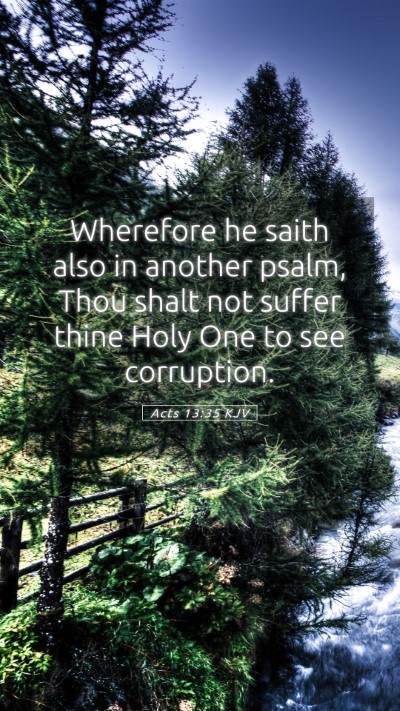Understanding Acts 13:35
Acts 13:35 states, "Wherefore he saith also in another psalm, Thou shalt not suffer thine Holy One to see corruption." This verse is a quotation from Psalm 16:10 and is significant in the context of the resurrection of Jesus Christ. Below is a summary of insights derived from several public domain commentaries on this scripture.
General Overview
This verse underscores a pivotal aspect of Christian doctrine: the resurrection of Jesus. It serves as an affirmation of God’s promise not only for His chosen one, Jesus, but also highlights God's covenantal faithfulness to His people.
Commentary Insights
-
Matthew Henry:
Matthew Henry emphasizes the notion of God's preservation of the Holy One from decay. He elaborates that this indicates God's power over death and reinforces the belief that Jesus, being sinless, did not experience death's decay. The resurrection thus becomes a key to understanding God's involvement in delivering His faithful people.
-
Albert Barnes:
Albert Barnes points out that the quotation from the Psalms is significant in establishing the validity of the resurrection claims made by the apostles. He interprets this verse as prophetic, signifying that Jesus’ body would not undergo decay, validating Jesus' Messiahship and the assurance of eternal life for believers.
-
Adam Clarke:
Adam Clarke provides a detailed examination of the implications this verse has for the understanding of the Holy Spirit's role in resurrection. He emphasizes the sacrificial nature of Christ's death and the triumph shown in His resurrection, which is also a promise of life after death for the faithful.
Theological Significance
This verse is critical for establishing the Christian understanding of resurrection and eternal life. It assures believers that death does not have the final say, as seen in both the life of Jesus and God's promises to His people. This is foundational for Bible verse interpretations focusing on hope and eternal security.
Related Concepts
- Resurrection of Jesus: Acts 13:35 closely aligns with the resurrection narrative found in the Gospels as a confirmation of Jesus' divine nature.
- Promise of Eternal Life: The verse serves as a promise that believers will share in the resurrection of the Holy One.
- Old Testament Prophecies: This verse finds its roots in Old Testament prophecy, affirming that Jesus is the fulfillment of those prophecies.
Sacrificial Context
The understanding of this verse is incomplete without acknowledging the sacrificial context of Christ’s death. He is portrayed as the Paschal Lamb whose resurrection signifies victory over sin and death—a theme that is emphasized throughout the New Testament.
Cross-References
This verse is also related to the following passages:
- Psalm 16:10: The original source of the quotation, which speaks to God's promise regarding the Holy One.
- Romans 6:9: Affirms that Christ being raised from the dead will never die again.
- 1 Corinthians 15:55-57: Discusses the victory over death that believers have through Christ.
- Acts 2:27-31: Peter's sermon linking this prophecy to the reality of Christ's resurrection.
- Hebrews 13:20: References Jesus as the great shepherd who was raised from the dead.
Application of the Verse
For believers today, Acts 13:35 offers profound comfort and assurance. It encourages one to reflect on the transformative power of Christ's resurrection in their lives and motivates believers to engage with scripture in significant ways, thereby strengthening their faith and reliance on God's promises.
Conclusion
In summary, Acts 13:35 serves as a cornerstone for understanding the resurrection narrative and its implications for believers. The interpretations from Matthew Henry, Albert Barnes, and Adam Clarke collectively enhance our comprehension of this profound scripture, enriching our Bible study insights and strengthening our theological frameworks.


